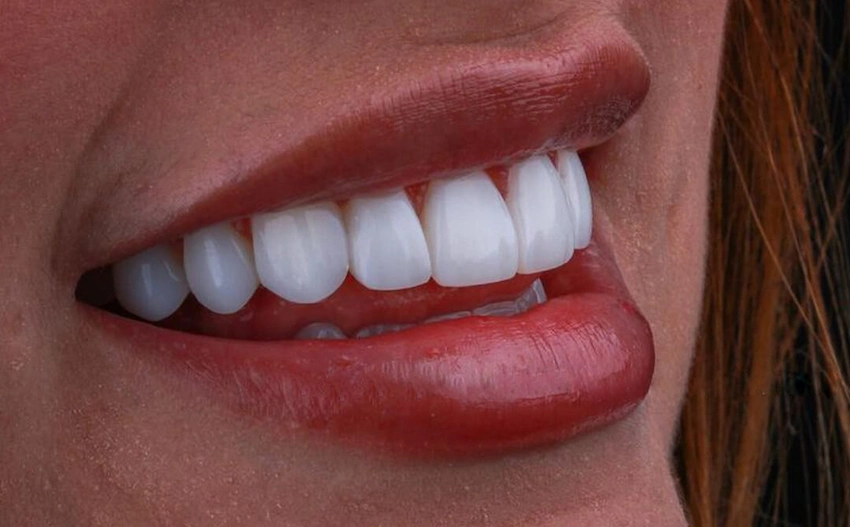🥤 Why Do Your Teeth React to Hot and Cold?

What Is Tooth Sensitivity to Temperature?
When your teeth feel sore when you eat or drink something hot or cold, this is called tooth sensitivity to temperature. The pain level can range from slight discomfort to a very severe and intolerable pain. It usually occurs when the soft interior part of the tooth, or dentin, is revealed. Dentin has a direct road leading to the nerve endings of the tooth. Thus, it’s quite sensitive to any changes in its temperature.
Such a reaction is the first and common sign of the wearing down or destruction of the enamel of the tooth. The brittle and rough exterior layer of the tooth, called enamel, functions as a shield, acting as a protective layer from the outside world, such as hot or cold temperatures. When the enamel is lost or the gums give way, thus exposing the dentin, the temperature change can be felt much more directly in the tooth. This problem is widespread among people and can affect all teeth, not only a select few.
At Lema Dental Clinic, we create Hollywood Smiles that blend beauty and comfort, offering personalized treatments like veneers and implants to ensure your smile looks flawless and feels natural. Let us help you achieve the smile of your dreams with expert care and advanced technology.
Main Causes of Hot and Cold Sensitivity in Teeth
If we talk about the most frequent sources of teeth-related temperature sensitivity, the first thing that comes to mind is the loss of enamel. Enamel, the hardest substance in the human body, can wear off due to the consumption of acidic foods and beverages, wrong brushing methods, and even bruxism at night. So, the dentin, the sensitive layer underneath enamel, once it is exposed, is the part that is directly affected by hot or cold stimuli, and we have the pain.
However, the main reason is the exposure of the root surface after receding gums. With the root of the tooth left out and no enamel to shield it, any temperature change will find the nerve right at the root, and the reaction will be a sore tooth. In addition to this, if there is tooth decay, cavities, or teeth, they can also be the cause of sensitivity to temperature. These problems can ruin the tooth’s structure and make it more sensitive to external factors such as hot and cold temperatures.
How Enamel Loss Leads to Temperature Reactions

Given that the enamel serves as a barrier between the teeth and the outside environment, it is responsible for protecting the teeth from temperature changes. When enamel disappears, i.e., because of reasons such as the abidance of acidic foods/drinks, it suffers from abrasion, brushing with hard bristles, or the habit of teeth clenching and grinding, the dentin layer lying beneath the enamel is exposed to the outer world. This dentin is full of small channels, through which the information passes to the nerves of the tooth when discomfort occurs, i.e., you may feel pain or discomfort after consuming a hot or cold food or beverage.
The reduction of enamel can go slowly, so you may not be very quick in noticing it at first. Nevertheless, the unmitigated dentin can result in chronic hyperesthesia, especially as a result of food and drink, such as cold water, hot coffee, and ice cream. It has also become clear that a lot of the world’s population has developed problems with their teeth because of the modern diet, with a majority being affected by diet-induced tooth decay. The reason for this is that the enamel wears out over time, and the bacteria’s activity is supported by foods eaten regularly; therefore, the number of caries-causing bacteria in the mouth increases.
Dental Conditions Linked to Temperature Sensitivity

Temperature sensitivity can be caused by some dental conditions, with gum recession considered one of the most common symptoms. As the gum tissue pulls away from the tooth’s surface, it reveals the roots of the teeth that do not have any enamel to cover their surfaces. So, even a small change in temperature can cause a sharp shooting pain in this area of the mouth. Other than gum recession, other problems in the teeth system may cause hypersensitivity of the teeth, such as tooth decay and fractures. On the one hand, when a tooth is infected with caries, the layers are rotted, which leaves the inside of the tooth open.
Also, dental work very often gives patients like seals, crowns or procedures such as teeth whitening a high chance of sensitivities that are temporary in nature. The placement of a filling or crown may make the tooth more sensitive to temperature. This will only last for a short period, after which the pain will go away completely. Sometimes the nerves inside the teeth may feel pain due to strong bleaching, which can trigger sensitivity to cold and hot for a limited time. Most conditions of discomfort that can be solved are those that result from poor dental care if not treated properly.
Treatment Options for Temperature-Sensitive Teeth
To be sure the teeth that are carrying the sensitivity of temperature are well treated, the dentist will prescribe one of several therapies to meet the individual needs of your case. It is considered that one of the solutions that is the most readily accessible and, at the same time, the most easily accessible is the use of various commercially available desensitizing toothpastes that act as the so-called “tubule” blockers. Talking through with the dentist is one of the things you should do before making up your mind which treatment to use, as the blockage of the pulp will require an x-ray that only the dentist can do, and the dentist would recommend desensitizing toothpaste if the teeth are found to be suffering from cold or hot sensitivities and nothing else could be the cause of the problem.
It can also happen that a more complex case will be treated with fluoride varnishes, which, by adding strength to the enamel layer, can aid in the reduction of sensitivity. It could very well be that at the same time the dentist gives the patient some alternatives of dental procedures to choose from, these could be, for example, bonding and other things. Of these, the one that is a point of example is the application of resin on the dentin that may have become exposed as a result of a certain level of temperature sensitivity. When one of the symptoms of the sensitivity that is being referred to is a tooth that is cracked, then following the dentist’s advice will make a great way to have that tooth repaired with the use of a filling, which makes the remaining filling leak-free.
How to Prevent Future Sensitivity from Temperature Changes

One of the best ways of preventing tooth sensitivity is by practicing good oral hygiene. Cleaning your teeth with a gentle-bristle toothbrush and adopting an easy brushing technique are primarily aimed at preserving the enamel of your teeth.
Avoid putting too much force while brushing–this is because it’s wearing away the enamel slowly. Moreover, you can use a toothpaste with a high amount of fluoride to help mineralize the enamel and alleviate the pain of tooth sensitivity.
The second option that can be carried out for rescue is to abstain from consuming too much acidic food and drinks, such as citrus fruits, soda, and wine, effectively making the enamel wear out at a rapid pace. Besides this, one can make an effort to employ toothpaste for sensitive teeth when suffering from gum recession, and the dentist can explain the various treatment options to stop the recession from advancing. As a regular check-up, it’s crucial to visit the dentist and have check-ups as this is one of the ways to keep the teeth healthy and, at the same time, find any early signs of enamel erosion or gum recession.
FAQ: What Makes Your Teeth React to Temperature Changes?
It’s usually due to exposed dentin caused by enamel erosion, which makes your teeth sensitive to temperature changes.
Yes, enamel erosion exposes the sensitive dentin underneath, leading to temperature sensitivity.
Not always, but cavities can cause sensitivity. Other factors like gum recession or enamel loss can also contribute.
Use desensitizing toothpaste and avoid extreme temperatures. For severe cases, consult your dentist.
If sensitivity persists or worsens, it’s best to consult a dentist for proper diagnosis and treatment.




